Quarantine Read online
Page 2
Do I talk to Martha? I can't see how it could upset her lawyers, and even if she hired me herself (which can't yet be ruled out completely; her finances may have hidden depths) then she chose anonymity over the alternative of explicitly instructing me to keep my distance.
I have no real choice but to act as if I hadn't given a moment's thought to the question of my client's identity -even if the truth is that, so far, nothing about the case fascinates me more.
Martha looks very much like her sister, with a little more flesh and a lot more worries. On the phone she asked, 'Who are you working for? The hospital?' When I told her that I wasn't free to disclose my client's name, she seemed to take that to mean yes. (In fact, it's inconceivable; IS owns a great slab of shares in Pinkerton's Investigations, so the Hilgemann would never hire a freelance.) Now, face to face, I'm almost certain that she wasn't dissembling.
'Really, I'm the last person to help you find Laura. She was in their care, not mine. I can't imagine how they could have let something like this happen.'
12
'No - but forget their incompetence, just for a moment. Do you have any idea why someone might want to kidnap Laura?'
She shakes her head. 'What use would she be to anyone?' The kitchen, where we're sitting, is tiny and spotless. In the room next door, her boys are playing this summer's craze, Tibetan Zen Demons on Acid vs Haitian Voodoo Gods on Ice - and not in their heads like the rich kids; she winces at the sound of a theatrically bloodcurdling scream, followed by a loud, wet explosion, and live cheers. 'I've told you, I'm in no better position to answer that than anyone else. Maybe she wasn't kidnapped. Maybe the Hilgemann harmed her somehow -mistreated her, or tried out a new kind of drug that went wrong - and their whole story about her disappearance is a cover-up. I'm only guessing, of course, but you ought to keep the possibility in mind. Assuming that you are interested in finding out the truth.'
'Were you close to Laura?'
She frowns. 'Close? Haven't they told you? What she's like?'
'Attached to her, then? Did you visit her often?'
'No. Never. There was no point visiting her - she wouldn't have known what it meant. She wouldn't have known it was happening.'
'Did your parents feel the same way?'
She shrugs. 'My mother used to see her, about once a month. She wasn't fooling herself - she knew it made no difference to Laura - but she thought it was the right thing to do, regardless. I mean, she knew she'd feel guilty if she stayed away, and by the time they had mods that could fix that, she was too set in her ways to want to change. But I've never had any problem, myself; Laura's not a person, so far as I'm concerned, and I'd only feel like a hypocrite if I tried pretending otherwise.'
Ί take it you're planning to be a bit more sentimental in court?'
She laughs, unoffended. 'No. We're suing for punitive damages, not compensation for "emotional suffering".
13
The issue will be the hospital's negligence, not my feelings. I may be an opportunist, but I'm not going to perjure myself.'
On the train back into the city, I wonder: would Martha have arranged her sister's abduction, for the sake of punitive damages? Her unwillingness to milk the suit for all it's worth might be a calculated ploy, a way to ensure a jury's sympathy by seeming to forgo exploitation. There's at least one flaw in this theory, though: why not demand a ransom - which could be recovered, through the courts, from the Hilgemann? Why leave the motive for the kidnapping a mystery crying out for an explanation, inviting suspicions of fraud?
I emerge from the airless crush of the underground to find the streets almost as crowded, with evening shoppers lugging post-Christmas bargains, and buskers so devoid of talent - natural or otherwise - that I feel like stooping down and switching their credit machines into refund mode.
'You're a mean-spirited bastard,' says Karen. I nod agreement.
As I approach the sandwich-board man, I tell myself I'm going to walk by as if I hadn't even noticed him, but a few steps later, I stop and turn to stare. His meekly downturned face is as pale as a slug - God doesn't want us messing with our pigmentation! - and he wears a black suit that must be purgatory in this heat. Amongst the brightly clad, bare-limbed crowd, he looks like a nineteenth-century missionary stranded in an African marketplace. I've seen the same man before, wearing the same imaginative message, repeated front and back:
sinners
repent! judgement is nigh!
Nigh! After thirty-three years, nigh! No wonder he stares
14
at the ground. What the fuck has been going on in his brain for the last three decades? Does he wake every morning, thinking - for the ten-thousandth time -'Today's the day'? That's not faith, it's paralysis.
I stand awhile, just watching him. He paces slowly back and forth along a fixed path, halting when the flow of shoppers is too heavily against him. Most people are ignoring him, but I notice a teenage boy collide with him intentionally and roughly shoulder him aside, and I feel a shameful surge of delight.
I have no good reason to hate this man. There are millenarians of every kind, from docile idiots to cunning profiteers, from blissed-out Aquarians to genocidal terrorists. Members of the Children of the Abyss don't wander the streets with sandwich boards; blaming this pathetic wind-up toy for Karen's death makes no sense at all.
As I walk on, though, I can't help indulging a sweet vision of his face as a bloody red pulp.
I was eight years old when the stars went out.
November 15th, 2034, 8:11:05 to 8:27:42 gmt.
I didn't witness the circle of darkness, growing from the antisolar point like the mouth of a coal-black cosmic worm, gaping to swallow the world. On TV, yes, a hundred times, from a dozen locations - but on TV it looked like nothing but the cheapest of special effects (the satellite views all the more so; in glare-filtered shots, the 'mouth' could be seen closing precisely behind the sun, an implausible symmetry, smacking of human contrivance).
I couldn't have seen it live; it was late afternoon in Perth - but the news reached us before sunset, and I stood on the balcony with my parents, in the dusk, waiting. When Venus appeared, and I pointed it out, my father lost his temper and sent me inside. I don't recall exactly what I said; I'm sure I knew the difference between stars and planets, but perhaps I made some childish joke. When I looked through my bedroom window - with a choice of smeared glass or dusty flyscreen - and saw, well,
15
nothing, it was hard to be impressed. Later, when I finally caught an unimpeded view of the empty sky, I dutifully tried to feel awestruck, but failed. The sight was as unspectacular as an overcast night. It was only years later that I understood how terrified my parents must have been.
There were riots on Bubble Day across the planet, but the worst of the violence took place where people had seen the event with their own eyes - and that depended on a combination of longitude and weather. Night stretched from the western Pacific to Brazil, but cloud covered much of the Americas. There were clear skies over Peru, Colombia, Mexico and southern California - so Lima, Bogota, Mexico City and Los Angeles suffered accordingly. In New York, at eleven past three in the morning, it was bitterly cold and overcast - and the city was all but spared. Brasilia and Sao Paulo were saved by the light of dawn.
Disturbances in this country were minor; even on the east coast, sunset came too late, and apparently most Australians sat glued to their TVs all night, watching other people do the looting and burning. The End of the World was far too important to be happening anywhere but overseas. There were fewer deaths in Sydney than on the previous New Year's Eve.
In my memory, there is no gap at all between the event itself and the announcement of an explanation (of sorts). Analysis of the timing of the occultations had revealed, almost at once, the geometry of what had happened; perhaps I considered that enough of an answer. It was nearly six months later that the first probes encountered The Bubble, but the name had been in use, from the start, for whate
ver it was they would find.
The Bubble is a perfect sphere, twelve billion kilometres in radius (about twice as wide as the orbit of Pluto), and centred on the sun. It came into being as a whole, in an instant - but because the Earth was eight light-minutes from its centre, the time-lag before the last starlight reached us varied across the sky, giving rise to
16
the growing circle of darkness. Stars vanished first from the direction in which The Bubble was closest, and last where it was furthest away - precisely behind the sun.
The Bubble presents an immaterial surface which behaves, in many ways, like a concave version of a black hole's event horizon. It absorbs sunlight perfectly, and emits nothing but a featureless trickle of thermal radiation (far colder than the cosmic microwave background, which no longer reaches us). Probes which approach the surface undergo red shift and time dilation - but experience no measurable gravitational force to explain these effects. Those on orbits which intersect the sphere appear to crawl to an asymptotic halt and fade to black; most physicists believe that in the probe's local time, it swiftly passes through The Bubble, unimpeded - but they're equally sure that it does so in our infinitely distant future. Whether or not there are further barriers beyond is unknown - and even if there are not, whether an astronaut who took the one-way voyage would find the universe outside unaged, or would emerge just in time to witness the moment of its extinction, remains an open question.
Upon hearing reports containing only a single familiar phrase, the media (who'd been fobbed off for six months with theories even wilder than the truth) promptly declared that the solar system had 'fallen into' a large black hole, triggering a resurgence of global panic before the story could be set straight. The event horizon surrounded us, therefore we had to be inside it - a perfectly reasonable mistake. The truth, though, is the exact opposite: the event horizon does not enclose us; it 'encloses' everything else.
Although a handful of theoreticians valiantly struggled to concoct a model for The Bubble as a spontaneous natural phenomenon, there was always really only one plausible explanation: a vastly superior alien race had constructed a barrier to isolate the solar system from the rest of the universe.
The question was: why?
17
If the aim was to discourage us from charging out and conquering the galaxy, they needn't have bothered. In 2034, no human had travelled further than Mars. The US base on the moon had been shut down six years before, after eighteen months' occupation. The only spacecraft to have left the solar system were probes sent to the outer planets in the late twentieth century, crawling away from the sun along their now purposeless trajectories. Plans to launch an unmanned mission to Alpha Centauri in 20S0 had just been rescheduled to 2069, in the hope that the Apollo XI centenary would make fundraising easier.
Of course, a space-faring alien civilization might have taken a long-term view. The thousand years or so before humans were likely to embark on anything remotely like interstellar conquest might have seemed no more to them than a judicious safety margin. Nevertheless, the idea that a culture able to engineer space-time in ways we could scarcely comprehend could fear us was ludicrous.
Maybe the Bubble Makers were our benefactors, saving us from a fate infinitely worse than being confined to a region of space where we could - with care - prosper for hundreds of millions of years. Maybe the galactic core was exploding, and The Bubble was the only possible shield against the radiation. Maybe other, hostile aliens were running amok in the region, and The Bubble was the only way to keep them at bay. Less dramatic variations on this theme abounded. Maybe The Bubble was there to protect our fragile, primitive culture from the harsh realities of interstellar commerce. Maybe the solar system had been declared a Galactic Heritage Zone.
A few intellectually rigorous killjoys argued that any explanation to which humans could relate was probably anthropomorphic nonsense, but nobody invited them onto talk shows.
At the other extreme, most religious sects had no trouble plucking glib answers from their own ludicrous mythology. Fundamentalists of several faiths refused to acknowledge that The Bubble even existed; all proclaimed that the vanished stars were a sign of divine
18
disfavour, foretold - with varying degrees of prophetic licence - in their own sacred writings.
My parents were resolute atheists, my education was secular, my childhood friends were either irreligious, or the marginally Buddhist grandchildren of Indochinese refugees - but the English-language media, worldwide, was swamped with the views of Christian fundamentalists, so theirs was the lunacy I grew up knowing the best, and despising the most. The stars had gone out! If that didn't spell Apocalypse, what did? (In fact, Revelations has stars falling to the earth - but one musn't be too literal-minded.) Even those fanatics with small-M millennial fetishes could take heart; the years 2000 and 2001 might have been frustratingly devoid of cosmic portents, but, given the uncertainties of the historical record, 2034 (it was claimed) could easily be exactly the two-thousandth anniversary, not of Christ's birth, but of his death and resurrection. (November 15th as Easter? Obscure explanations were concocted for this - including something called 'Passover Drift' - but I was never quite masochistic enough to try to follow them.)
It was Judgement Day rewritten by some Bible Belt Chamber of Commerce. TV still worked, and nobody needed the mark of the beast to buy and sell, let alone to give and receive tax-deductible donations. Mainstream churches issued cautious statements which said, in so many words, that the scientists were probably right, but their pews emptied, and the salvation-for-money trade boomed.
Apart from post-Bubble splinter groups of established religions, thousands of brand-new cults appeared - most of them organized on the sound commercial lines pioneered by twentieth-century religious entrepreneurs. But while the opportunists prospered, the real psychotics were festering. It took twenty years for the Children of the Abyss to make themselves known, but then, being born of the Abyss - on or after Bubble Day - was a prerequisite of membership. They started out, in 2054, by poisoning the water supply of a small town in Maine,
19
killing more than three thousand people. Today, they're active in forty-seven countries, and they've claimed almost a hundred thousand lives. Marcus Duprey, their founder and chief self-fulfilling prophet, spews out an incoherent stream of half-digested cabbalistic gibberish and comic-book eschatology, but there are, apparently, thousands of people brain-fucked in just the right way to find his every word resonant with truth.
It was bad enough when they blew up buildings at random, because 'this is the Age of Mayhem', but since Duprey and seventeen other Children have been in prison, many of his followers have come to see his release as their ultimate purpose -and with a tangible (if unattainable) goal to focus their efforts, everything has escalated. It makes no difference what I think, but some nights the question spins in my head for hours. I don't wish they'd set him free. I do wish they'd never caught him.
Mental illness wasn't confined to the millenarians; for the secular, there was Bubble Fever, an hysterical, disabling, 'claustrophobic' reaction to the thought of being 'trapped' in a volume eight trillion times that of the Earth. These days, it seems almost laughable - as quaint as some spurious nineteenth-century upper-class affliction - but millions of people succumbed in the first year. It struck in almost every country, and health officials predicted it would cost the world economy more than AIDS. Within five years, though, the number of cases had plummeted.
Wars and revolutions around the globe have been blamed on The Bubble - although I wonder how anyone can claim to be able to untangle its destabilizing effects from those of poverty, debt, climate change, famine and pollution - and the religious fanaticism that would have been present, regardless. I've read that in the early days, people spoke seriously of civilization 'crumbling', of the coming of a new Dark Age. Such talk soon died away -but even now, I can never quite decide whether I find it miraculous, or inevitabl
e, that the cultural shock waves have been so mild. The Bubble changes everything: it
20
proves the existence of aliens with God-like powers, aliens who have imprisoned us without warning or explanation - and cheated us of our destiny in the universe. The Bubble changes nothing: the aliens are aloof and inconsequential, the stars are irrelevant to human needs; the sun still shines, crops still grow, the life of this planet goes on as ever - and there are worlds within our reach to be explored for millennia.
In the early fifties, it was 'common knowledge' - for no obvious reason - that the Bubble Makers were about to introduce themselves and justify everything; alien-contact cults flourished, UFO hoaxes reached absurd levels, but as the years wore on in silence, hopes of so much as a curt explanation for our state of quarantine faded away.
I no longer even wonder, why? After thirty-three years of listening to people rant their unlikely hypotheses, nothing could matter to me less. (Granted, the thing killed my wife, indirectly -but then, indirectly, so did I.)
As for the stars, they were never ours to lose; the truth is, we've lost nothing but the illusion of their proximity.
Bella, as always, delivers on time. I download the records into CypherClerk's generous intracranial buffers, and I'm on the verge of transferring them to my desktop terminal when, in a moment of caution, or paranoia, I change my mind and decide to keep the data in my skull, for now.
I'm tired, but it's barely after nine. I don't want to sleep, but the prospect of ploughing through the Hilgemann's records strikes me as unbearably tedious.
I invoke Backroom Worker (Axon, $499) and guide it through what I want done with each name: first, check my own natural memory for any associations (after all, the chances are that the next of kin of anyone worth kidnapping will be a public figure to some degree); then contact the Credit Reference System, obtain current financial details, and append them to the record. I think of triggering notification if the assets cross a threshold value, but I can't be bothered deciding on a figure, and in any

 Zendegi
Zendegi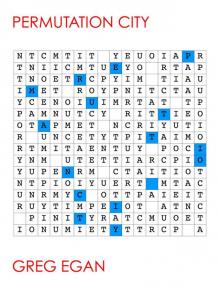 Permutation City
Permutation City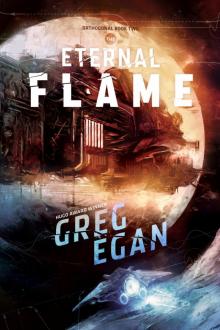 The Eternal Flame
The Eternal Flame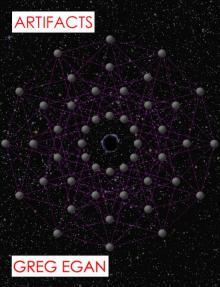 Artifacts
Artifacts Wang's Carpets
Wang's Carpets Dichronauts
Dichronauts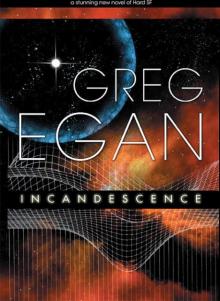 Incandescence
Incandescence Teranesia
Teranesia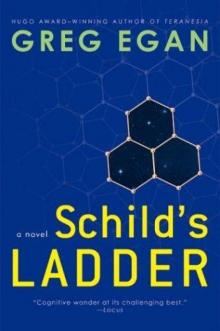 Schild's Ladder
Schild's Ladder Quarantine
Quarantine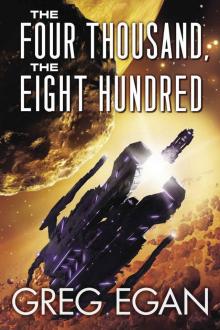 The Four Thousand, the Eight Hundred
The Four Thousand, the Eight Hundred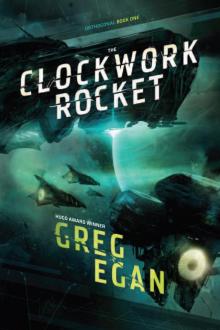 The Clockwork Rocket
The Clockwork Rocket Zeitgeber
Zeitgeber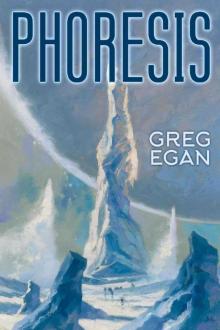 Phoresis
Phoresis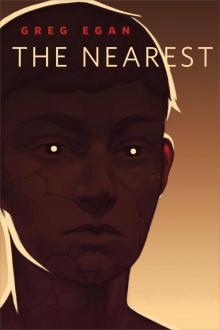 The Nearest
The Nearest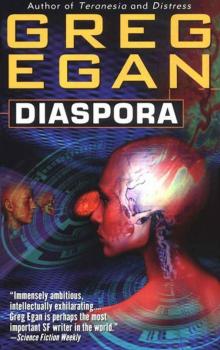 Diaspora
Diaspora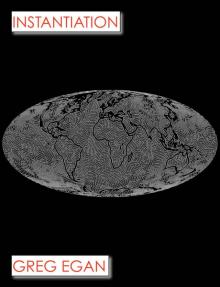 Instantiation
Instantiation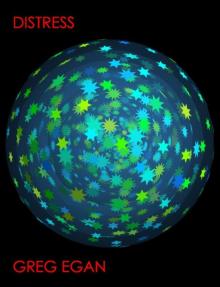 Distress
Distress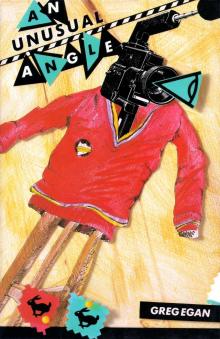 An Unusual Angle
An Unusual Angle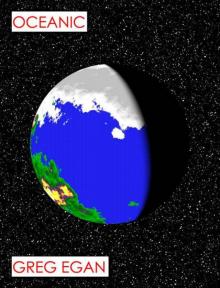 Oceanic
Oceanic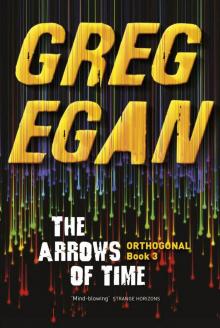 The Arrows of Time
The Arrows of Time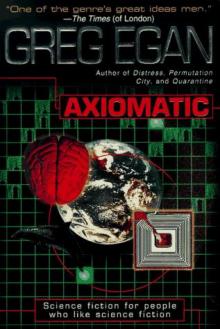 Axiomatic
Axiomatic![Anthology 2. Luminous [1998, 2010] Read online](http://i1.bookreadfree.com/i/03/18/anthology_2_luminous_1998_2010_preview.jpg) Anthology 2. Luminous [1998, 2010]
Anthology 2. Luminous [1998, 2010]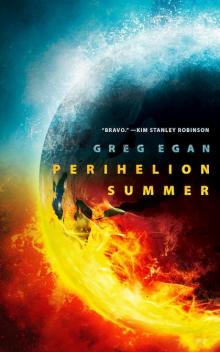 Perihelion Summer
Perihelion Summer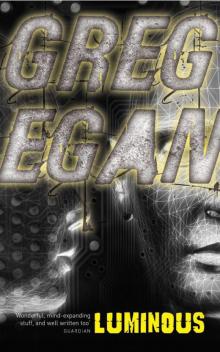 Luminous
Luminous